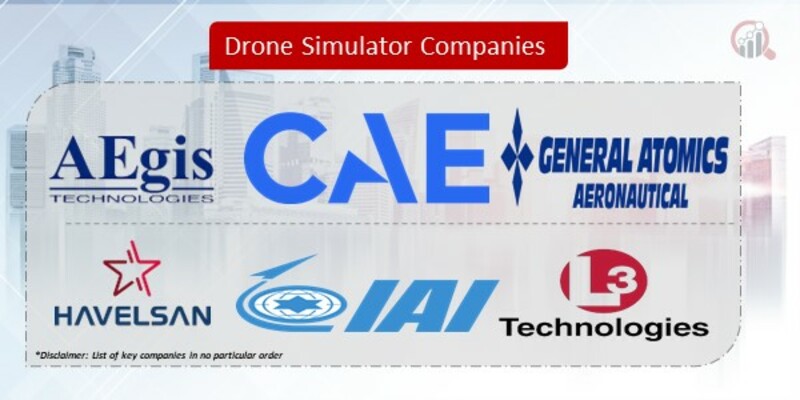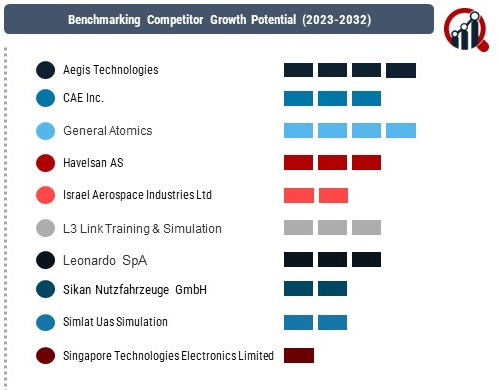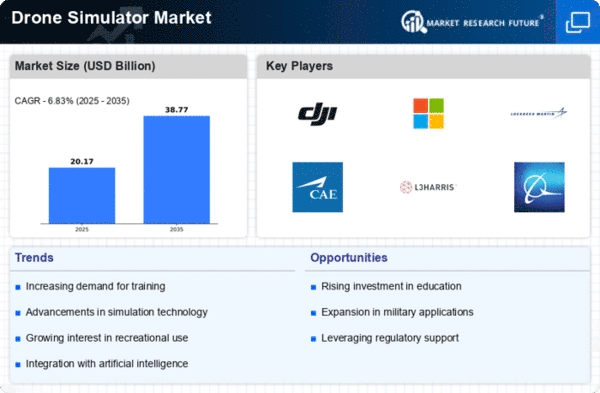Top Industry Leaders in the Drone Simulator Market

Key Players and their Strategies:
Aegis Technologies (US)
CAE Inc. (Canada)
General Atomics (US)
Havelsan AS (Turkey)
Israel Aerospace Industries Ltd (Israel)
L3 Link Training & Simulation (UK)
Leonardo SpA (Italy)
Sikan Nutzfahrzeuge GmbH (Germany)
Simlat Uas Simulation (Israel)
Singapore Technologies Electronics Limited (Singapore)
and Zen Technologies Limited (India).
Factors for Market Share Analysis:
Market share analysis in the drone simulators industry is influenced by several key factors. Product innovation, pricing strategies, partnerships, and geographical reach play pivotal roles. Companies that consistently invest in R&D to enhance simulator capabilities and offer a realistic training experience are positioned to capture a larger market share. Competitive pricing and strategic partnerships with drone manufacturers and training institutions can also boost market presence. Furthermore, a global footprint ensures that companies can tap into various regional markets, expanding their overall market share.
New and Emerging Companies:
In the ever-expanding drone simulators market, new and emerging companies are making significant strides. Firms such as Simlat, ECA Group, and Leonardo are gaining prominence with their unique offerings. Simlat specializes in professional-grade drone simulators for both military and civilian applications. ECA Group focuses on providing solutions for complex and mission-critical drone operations, while Leonardo, a key player in aerospace and defense, is extending its reach into the drone training space.
These emerging companies often bring fresh perspectives and innovative technologies to the market, intensifying competition and driving established players to adapt and evolve. The influx of new entrants contributes to the dynamism of the competitive landscape, fostering an environment of continuous improvement and innovation.
Industry News and Trends:
Staying abreast of industry news and trends is crucial for understanding the competitive dynamics within the drone simulators market. The integration of artificial intelligence (AI) and machine learning (ML) technologies into simulators is a notable trend, enhancing the adaptability of simulators to different scenarios and improving training outcomes. Moreover, the increasing demand for cloud-based simulator solutions is transforming the way training programs are delivered, allowing for greater flexibility and accessibility.
Another trend is the incorporation of gamification elements into drone simulators, making training more engaging and interactive. This approach not only caters to a younger generation of drone operators but also improves the overall effectiveness of training programs. As the industry evolves, keeping an eye on such trends is essential for companies to stay competitive and relevant.
Current Company Investment Trends:
Investment trends within the drone simulators market underscore the industry's growth potential. Venture capital funding, mergers and acquisitions, and strategic partnerships are prevalent in this space. Start-ups with novel technologies often attract funding from venture capitalists looking to support innovation. Meanwhile, established players may pursue mergers and acquisitions to expand their product portfolios or acquire cutting-edge technologies.
Strategic partnerships are also common, allowing companies to combine their strengths and offer comprehensive solutions. For example, a drone simulator provider might partner with a VR/AR technology firm to create more immersive training experiences. Monitoring these investment trends provides valuable insights into the strategic direction of companies and the overall trajectory of the market.
Overall Competitive Scenario:
In the current competitive scenario of the drone simulators market, the interplay of established players, emerging companies, market trends, and investment activities creates a dynamic landscape. The focus on realism, innovation, and diverse applications has led to a broad spectrum of offerings catering to various user segments. Whether for recreational drone enthusiasts, professional operators, or military personnel, there is a growing array of simulators tailored to specific needs.
As companies vie for market share, the ability to adapt to technological advancements, understand evolving training requirements, and establish strategic partnerships will be key differentiators. The competitive landscape is not only shaped by the products themselves but also by the support, training, and additional services that companies provide to their customers. As the drone industry continues to evolve, the competitive scenario in the drone simulators market is set to remain fluid, creating opportunities for both established players and new entrants to make their mark in the virtual skies.
Recent News :
CAE Inc. stands out for its comprehensive training solutions, combining drone simulators with virtual reality (VR) and augmented reality (AR) technologies. RealFlight, known for its consumer-focused approach, offers simulators that cater to drone hobbyists and enthusiasts. Each key player adopts distinct strategies to capture different segments of the market, reflecting the diverse applications of drone simulators.
DJI Innovations (DJI):
Launched the DJI Flight Simulator, offering realistic drone piloting experiences from beginner to advanced levels, catering to both hobbyists and professionals.
Partnered with leading flight schools to integrate their simulator into training programs, further solidifying their presence in the professional training market.
X-Plane Simulations:
Unveiled the X-Plane 13 flight simulator, featuring enhanced drone physics and environments, attracting veteran sim pilots and drone enthusiasts alike.
Secured a contract with the U.S. Air Force to provide their drone simulator for pilot training, highlighting the increasing adoption in military applications.
Drone Racing League (DRL):
Developed the DRL Simulator, a competitive drone racing platform focusing on skill development and esports competitions, attracting a passionate gaming community.
Partnered with universities and tech companies to research and develop advanced drone training programs leveraging immersive simulation environments.
Skydio:
Announced the Skydio Autonomy Training Platform, a simulation experience allowing users to train AI-powered flight commands for their Skydio drones in virtual environments.
Collaborating with emergency response teams to develop specialized drone training scenarios for search and rescue operations.












